The “Louis Quarter” is a staffed community residence for the disabled in Penza [a city in central western Russia on the River Sura.—Trans.]. We talked with someone of remarkable energy, Maria Lvova-Belova—Director of the “Blagovest” charity, initiator and Manager of the “Louis Quarter” project—on how it managed to become a landmark of the city, which Louis it is named for, and how not to lose heart in seemingly hopeless situations.
“I won’t go to the Veterans’ Home—I will commit suicide”
—How did the “Louis Quarter” project start?
—It so happens that currently I head several charitable organizations at the same time. The first of them, “Blagovest”, was set up as early as 2008, when we began to work with abandoned children. And “Louis Quarter”, which provides a staffed residence for children, was created in 2010, at the time when we started working with the Nizhniy Lomov Children’s Home. Physically handicapped children with normal intelligence live there. And during one of my visits I asked a fifteen-year-old teenager what he was going to do after leaving the home. He answered: “Next will be the Veterans’ Home. But I won’t go there—I will commit suicide.” He said this simply, without pathos, even in an ordinary manner. It was his decision. He simply didn’t want to live as he felt unwanted and was unable to decide or do anything on his own. And I realized that all our current projects in that children’s home were useless. What use are they if these children have no future?
Indeed, formerly the only prospect for children living in this home was to go to an old people’s home on reaching the age of seventeen. But that institution is intended for a completely different purpose, and teenagers shouldn’t have to live in it. Nevertheless, they would live out their days there. As a rule, according to statistics they would live up to five years because they began to drink heavily. They had nothing else to do, and patients are not given proper care there, anyway.
We said, “Why are we preparing these children for adult life if they won’t have it?” And the children were very interesting, with big plans and aspirations, with the desire to have their own families, work and continue their education. And we set ourselves the task of helping them somehow.
In most cases, staffed community residence still presupposes the accommodation of people with mental retardation. The life for wheelchair users is considered to be “easier”. In reality, they face a lot of problems. They cannot even leave their homes and go somewhere. For this ramps, wheelchair stair platform elevators, and other facilities are needed. And their access to education is very limited too. Only a handful of colleges across Russia can admit them (you can count them on the fingers of one hand), which provide computer programming, accounting, and psychology programs. But they select very few applicants.
But I happened to visit Vienna in Austria. There I looked at public and state centers for children with this disability category, was impressed, and got back home. As a result we opened one more organization—the “Louis Quarter”. At that time the circumstances were such that my family and I changed our residence, and our old house was remodeled and adapted to meet the needs of our first five students. We knew that they would certainly feel better there than at an old age home.
But it was an experiment on slippery ground. At the same time, we realized that the children needed to do something and work. Our project is based on three pillars: training, residence, and work. The children should live in a space which is adapted to fulfil their needs and where they can have the maximum independence. Most of them are wheelchair users and have locomotive system diseases.
Children enter into a contract for four years; over this period we think over what their individual trajectory should be. We restore their right to own housing because they are orphans. They are allotted apartments just near Penza where the children’s home is situated. And if they are sent to the old people’s home, they won’t be provided with housing. They just sign a relinquishment of their apartments as they cannot take care of themselves.
But even those who are provided with housing find themselves in deplorable conditions, because in most cases their houses are far away from the city, and social workers only come once a week. Of course, they remain unemployed and cannot develop themselves. They live on their state pension—6,000 rubles (about ninety-five US dollars], and that is their ceiling.
—So they have no relatives?
—Virtually all of the children have parents and other relatives, but their relatives abandoned them right in maternity homes. Only two children in our care are orphans—that is, they lost their parents; the others were abandoned by their parents. Strangely enough, all of their parents are seemingly normal and successful people; for example, one mother is a judge in Moscow, another mother is the vice-principal of a school, and one father is a business manager. That is, they are respectable people who make a secret of the fact that once they had handicapped children and abandoned them.
For all that, in 2014 we decided that children under our care must be employed. However, since no one was going to employ them on account of their disability 1 group [which is considered the “non-working” group.—Trans.] and lack of the adapted space, we had to create social and business platforms for them on our own. Thus we opened our printing house, where those in our care work. Though it also has non-disabled staff workers—specialists who train and assist the handicapped ones.
“Your Eminence, I have an appointment with Medvedev, pray for me!”
—Does your printing shop receive orders and customers?
—We do all the printing word for our diocese. More than that, in effect we learned from their orders.
—Thus the Church has been supporting you and doing charity work?
—Surely. But working with us is beneficial for the Church because we print orders at cost price. We don’t take a markup. The fact is that initially we were on diocesan premises and used the diocesan printing presses, among other things. We have a wonderful ruling hierarch, Metropolitan Seraphim of Penza and Nizhniy Lomov. He has been supporting us a lot. And he said then: “Why not? We have the printers. Let us try and form one single entity.” They had two employees who joined us. So we only need money to pay our handicapped workers and we don’t pay for the utilities.
When we were in the developmental phase, we realized that if we talk about accessibility for the disabled and want “normal” people to change their attitudes towards them, we need to send those in our care to the service and acquaint those present with the disabled in an informal atmosphere. Accessibility is not only about ramps and doorways; it is first and foremost about viewing these people as equals. This is a very difficult task, and it can be carried out provided the disabled are near us all the time. How can it be achieved? Only if young disabled are in permanent contact with non-disabled members of society. Because even at the printers all they do is sit in their tiny room and stack leaflets.
—By the way, how did you meet Metropolitan Seraphim?
—Before he became our ruling bishop1 he was rector of the seminary, and we communicated with him as with a priest. And when he was consecrated a bishop in 2013, we began to work closely together as he has always been so kind to us.
I, for instance, can text him: “Your Eminence, I have an appointment with Prime-Minister Medvedev. Please, can you pray for me?” It is of invaluable help when I can just call him and say: “I feel bad. May I call on you?” He is always near us. He is a bishop who is not afraid of the theme of jazz. He may say while standing on the ambo: “We have the ‘Louis Quarter’, jazz, disabled people.” He is not afraid of experiments and doesn’t see sectarianism or “American influence” in this.
—Do you think that it is a utopian idea and an over-ambitious task to acquaint all of society with disabled people?
—I endorse the following approach: Though we won’t save everybody, we will surely help someone. Our life shows that if you begin with little things, you can eventually achieve a great deal. Only six years have passed, but our governor has announced the project, “Penza—a region of equals”. The entire city knows about our thirty young disabled people. It doesn’t matter which one of them is walking along the street—everybody will say that he is from the “Louis Quarter”. This is what the “small cities development policy” is about—each of them has its own peculiarity.
Today, the “Louis Quarter” is… a landmark of the city. Whenever dignitaries visit Penza, they are conveyed to us. Through our city’s example we can demonstrate that accessibility for the disabled in the urban milieu is possible everywhere.
When in 2014 all was just beginning, we came to realize that our task was huge and we needed to expand. We spoke with the metropolitan and suggested opening a café in which young disabled people would work. His Eminence gave us space, and there we equipped the first bar counter for wheelchair users in Russia. Wheelchair-bound fellows work as bartenders and serve customers there. They were trained by the best sommelier of the Volga region and can make excellent cocktails.
And they live independently. There are almost no staff there, apart from a supervisor who comes two or three times a week and teaches them cooking. So they cook, tidy up their rooms, and go shopping on their own.
The “disabled theme” should be vivid
—Why did you give your community such an original name as the “Louis Quarter”?
—After the American jazz musician Louis Armstrong. We have always wanted “the disabled theme” to be associated with something vivid and not dismal and defective. What are disabled people usually associated with in our country? On December 3, World Disability Day, all we see is biscuits, carnations, bedraggled disabled people in wheelchairs with their glasses on. Everything is always very sad.
I am the conductor of a big jazz band by training. We also named our community in honor of Armstrong because I am fond of improvising. I like freedom, the moment when the limits of what is possible are pushed further.
We supposed that music and creative work could unite disabled and non-disabled people. Jazz always gives an opportunity to improvise. And those in our care can improvise on what fate has given them, on the path towards the unsurpassed melody of their lives. Louis Armstrong was an African American, a social orphan, and idiosyncratic like our children. A street child, he became a legendary personality. Likewise, we believe our children can become legendary personalities and achieve something in this life as well.
And they can really do it! For example, my Daniel! His is a special story. It was he who introduced me to the realm of disabled people. At that time I was either pregnant or a nursing mother all the time. When I came to the children’s home for the first time, I was walking along the corridor nursing my newborn baby. I saw a legless boy sitting all alone. Due to his severe handicap he avoided everybody’s company and didn’t even play with the volunteers.
We started talking with him, and Daniel suddenly asked me to take him to our place: “I want to taste homemade food so much! I have never tried it.” So he began to stay with us for holidays and weekends. At night we would talk with him about loneliness and abandonment and his resentment towards his mother. Soon he began to call me “mother”.
One day Daniel and another boy performed a breakdance at a charity concert, and I suggested they send their video to TV Channel 1. I did it, they were invited to the show—and suddenly won. Thus in 2010 Daniel Anastasin became the winner of “Minute of Fame” Russian television talent show competition on Channel 1. His performance astounded both the audience and the jury. Now he goes on tours with famous dancers and studies at Moscow State Institute for Social and Humanitarian Studies [located within the picturesque Losinov Ostrov National Park in north-eastern Moscow.—Trans.]. It offers education and accommodation to its disabled students during the term. He is studying to become a psychologist.
One day he came to me between his tours in his cool car and we went out for a cup of coffee. He said to me, “Since recently I have been thinking a lot, trying to fathom why I am now twenty-one, and things have worked out this way for me? When I was fifteen, I was weeping in your kitchen, saying that it was the end of my life, that nothing awaited me, that I was too ‘defective’. And I understood that you had faith in me, and I tried my best to live up to your expectations all the time.”
His words were like a turning point for me: Since he has succeeded, the others must succeed too.
“She bought the first heeled boots in her life, knowing that she would never put them on”
—Please tell us also about another project of yours—the “House of Veronica’.
—The fact is that some of our children cannot live on their own and require permanent care. Then I suggested building another center for this category of handicapped people with round-the-clock residential staff. Thus we decided to open the “House of Veronica”—in honor of St. Veronica, a woman of Jerusalem who offered her head cloth to Christ on the way to Calvary, to wipe the blood and sweat from His face.
I approached the metropolitan and shared this idea with him. He answered: “I have some land. Let’s go look at it.” When we arrived, he said: “Let’s build it right here, beside the church.” I was confused: “What are we going to build? We have no money!” But, at the same time, I firmly believed that if this undertaking was pleasing to God, we would definitely succeed.
And indeed we soon had nine people—the future residents of the future center, and we had a gut feeling that we would move them into the new house. We had ten places and we decided to keep one of them vacant. Soon the director of the children’s home where we had taken the children from came to us and said: “Please, take another girl in a wheelchair.” But she had a serious learning disability, which is something we are not equipped for. At first I answered that we wouldn’t be able to take her, but the director said: “She will turn eighteen soon and be sent to the psychoneurological nursing home, where she will suffer horribly. We took pity on her.” And I learned that the girl’s name was Veronica. Can you imagine? The tenth and last vacant place, and the girl Veronica—the name of our center! And I concluded that we were on the right path.
Thus we took our Veronica, who initially couldn’t speak at all, but now she speaks in whole sentences, and she is currently being trained by a lot of specialists. And a year later our house was opened.
The mission of the “House of Veronica” is slightly different from that of the “Louis Quarter”. I realize that these boys and girls will stay with us forever. One girl died half a year after we had admitted her. She had a serious condition called muscular atrophy. Though bedridden, she managed to do much over the last six months of her life: she painted many high-quality pictures. She died right after finishing her last painting. After her death we organized an exhibition of her works. Earlier, she had bought the first heeled boots in her life, knowing that she was very unlikely to put them on.
It was a hard blow to us. But curiously enough, there was joy too. When we were speaking to a pathologist, he confirmed that she had lived the final six months of her life by some hidden reserves of energy. She desired to join our project and get the taste of life so much she lived for another year contrary to the doctors’ prognoses…
Her body was so worn out that she was expected to die a year earlier. And I was so happy we had time to do something for her at least for the last six months of her life. She succeeded in creating this exhibition and left a series of paintings—very beautiful and meaningful ones…
The “House of Veronica” can accommodate between ten and thirteen people. There is a hostel on its first floor. It provides workplaces for the disabled who are the hostel staff. Anyone—whether disabled or non-disabled—can put up at the hostel.
—How do those in your care work there?
—Those who have no serious disabilities work there. A man in an electric wheelchair gets to the first floor, showing the rooms and explaining the hostel rules to guests… A bedridden girl speaks through a small microphone.
—Do people often stop at your hostel?
—During last year’s World Cup we had guests from nine countries. In addition, atheletes, mothers with children coming here from the area for rehabilitation, along with young disabled people (when passing through) stay here. We are near a major highway, so people arrive here for an overnight stop during their journey. Frankly, it is not a very profitable business, but it covers our disabled staff salaries and part of the utilities.
People react in very interesting ways. Since it is impossible to leave additional information on the “Booking.com” website, we had been thinking for a long time of how to ensure that guests understand that they would be seen to by disabled staff. They arrive and, to their surprise, they are welcomed by someone in a wheelchair! And we finally decided to take photos of our workers in wheelchairs accommodating guests. One day I was sitting in my car and watching. A young man arrived and saw a man in a wheelchair, who came out to meet him. The man got out, looked for a moment, then got back in the car and drove around. Our administrator Katya [a diminutive form of the name Ekaterina.—Trans.], a very positive girl, cried to him: “Have you come to stop at our hostel?” He answered: “Probably yes.” She said: “Then let’s go, I’ll see to you!” That is, at first people are shocked and then they become our regular guests. We have a cozy, homey atmosphere. Our prices are low. More than that, they come and understand that they are making a social contribution as their money will be used to support this project.
It can be said that those in our care have become media personalities, the whole city (and not only the city) recognizes them, and that is very nice. For example, some of them became the first full-time university students in wheelchairs. There hadn’t been anything of this kind before due to lack of accessibility. At first we hired assistants who would help our wheelchair users by lifting them upstairs, but little by little the environment became more “wheelchair-friendly” because of the presence of such students.
She went skydiving, though she has CP
—Which departments are they studying in?
—Social Work and Management and Administration. They convert cars so they can get behind the wheel, travel to other cities, write books and poetry. And that is not profanation. One of them, Elena Troshina, received the honorary title of “the best female poet of the Penza region”. We took her from the old people’s home—she had stopped going to school after the third grade. This example demonstrates the full potential of those in our care and what they’re really able to do. Previously, she lived with her mother in a village, and they were told she was a learning-disabled child. But this girl read all the books in their village library, and later she read all the books in the library of the children’s home where she ended up at the age of twenty-five after her mother’s death. It was there that we first met her and decided to try. Now she can rise to her feet, though I had been warned that she was in a “vegetative state”. The publication of the third volume of her poems is underway; she went skydiving and trains school students, though she has cerebral palsy. Everybody falls silent with astonishment! She is so talented, so brilliant, like a speaker. She is the type of person who transforms everything around her.
—What else do you do?
—Currently we are implementing another project for the disabled. It’ll be a whole village, a property called “New Shores”. It is intended for those who were deprived of their right to ownership of housing but who can in fact live on their own. The metropolitan has given us his blessing, and we have been allotted some land by the governor; though when this idea was conceived many would give the screw-loose sign, saying that we must be crazy to undertake this work.
It will be a village where up to eighty people will be accommodated—seven residential houses, townhouses, with thirty-three apartments in them. We will have a cinema, a hotel, a shop, a bakery, a fitness room, a bathing and sanatorium facility, and a bath and sauna for the disabled where they can come in a wheelchair and take a bath. Of course, young disabled people will work there. They will also cook partially prepared foods and have an educational center.
—What phase of the project are you implementing now?
—We are completing two houses and on November 1 twenty-six people will move in. The third house is under construction. We are also starting the construction of an educational center and a bathing and sanatorium facility.
—It must be a very costly project.
—Now our builder’s estimate is 189 million rubles (c. 3 million US dollars). We can only wonder how we will manage this, but I must confess that our work is always accompanied by miracles. It was the same here. By a miracle I got an appointment with Prime Minister Dmitry Medvedev. I told him about our project and asked for his help. I said, “I know how it should be done and I know how to do it. We already have some good results. Please support us! There isn’t even any infrastructure for youth with disabilities. Let’s launch a pilot plan and then implement it all over the country.” The prime-minister seemed to be convinced by my words and he helped us in business matters—we have already received part of the funds from the businessmen whom he asked to finance us.
I keep saying that things will miraculously work out with God’s help. Sometimes I am scared, though. Now we are a general builder—a non-profit organization which does social work has got a special license for the first time in Russia’s history, hired building crews, and so on.
But we have removed all markups, minimized administration costs, and kept only one sixth of the original cost estimate. We’ve reached low cost and high quality. We are building social objects and I already know what they should look like. I was in Finland. My partner Alexei Kazaryan was in America and Germany. We accumulate useful experience all the time.
Living for yourself is boring
—You said that you are the conductor of a jazz orchestra by training. Did you have a chance to conduct a jazz big band?
—Only at graduation exams at Samara State Academy of Culture and Art.
—And what next?
—Then I became a mother. And then I gave birth to two more babies.
—How many children do you have?
—Five of my own and four adopted children. There are nine of them in all.
—And what is your husband? Who is this hero? What is his occupation?
—My husband is a programmer. He is our breadwinner actually, and the family can make both ends meet thanks to him.
—Is he religious?
—Yes, he graduated from a theological seminary and is going to be ordained a priest. I could have never imagined that I would become a priest’s wife one day.
—How did it come about that you, the conductor of a jazz group by training, switched to charity work?
—I was born into a family with many children and was the oldest daughter. So serving others feels natural to me.
—How many children were there in your parents’ family?
—There were four of us siblings, with a big age gap between us. All the siblings were practically entrusted to my care. I would even go out on dates accompanied by children, and I could make huge pots of soup. This obligated me to keep in mind that I didn’t live alone in the world. I couldn’t eat an apple alone—I had to share it with everybody. In this sense, a large family is quite an experience. In my opinion, what I am doing now became possible because I grew up in just such a family.
Besides, I am an Orthodox believer and remember that faith without works is dead (Jm. 2:17). You must do something!
—At what age did you become a church-goer?
—At the age of ten.
—Your parents took you to church?
—Yes, they did. My father had previously been an unbaptized non-believer, even a committed atheist. A musician, now he heads the Krasnodar Regional Opera and Ballet Theater. Father had never attended church before. He studied at Gnessins Russian Academy of Music. His roommate there was a very religious person, and under his influence father converted to Christ. One day he came home and said: “Let’s marry in church! And I’ll get baptized! It’s settled.” That was followed by his active integration into Church life. Then he sang in the choir. At that time I was attending a music school, and from the age of thirteen I began to sing in the church choir, too. That was salvific for me, since I spent adolescence in church. I enjoyed that very much. On weekdays and whenever I had spare time I was always in church. I sang in the choir and I still do so despite my busy schedule. I realized that it was my source of strength. When I stand in church and sing, I return to normal and put my thoughts in order. It is virtually the only place where I stand without a cellphone and can renew my contact with God.
 Maria Lvova-Belova with family. Photo by Gayane Avdalyan/ASI-Penza)
Maria Lvova-Belova with family. Photo by Gayane Avdalyan/ASI-Penza)
—But how did you switch to charity work?
—My husband and I already had two children. I was twenty-three. I told him that we must do something and help someone. Living for yourself is boring. So we started searching for charities, although at that time we found nothing. One day we visited the regional children’s hospital. I saw a church there, along with a priest’s phone number. I called him and said: “Father, what kind of social work do you do? I’d like to join you.” He answered: “Nothing really yet. I can talk with the head doctor, if you like.” Thus I started providing diapers for abandoned children. All of a sudden the chief physician said: “Why only diapers? They need care!” But what could I do? At that moment I had two babies, one of them was still a nursling.
So Anna Kuznetsova, the current Russian Children’s Rights Commissioner, and I started gathering a team of volunteers. For a long time we were the co-heads of the same organization. Later we drifted apart, though. Two strong personalities not getting along in the same organization is a perennial problem. Perhaps it was for the better. Anna founded her powerful organization. Today we have two serious charitable organizations in Penza. Now we are on good terms and I am one of her daughters’ godmother.
All my life is a sort of adventure. And if it were not for my conviction that the Lord arranges everything, I don’t know how I would have managed all this work. For example, I go to sleep with the thought that tomorrow I must get half a million rubles (c. 7,930 US dollars) somewhere, though I don’t have it and have no idea where to get it from. And I have so many responsibilities: a ward of abandoned children with six nurses in it who work around the clock with these children, and I cannot give them up—and these are paid jobs. I have two staffed community residences, large-scale building work, a host of other projects, and a big team of administrative staff. And if I imagine I make plans in advance, then it is easy just to lie down and die…
—Where do you and your staff get your energy?
—Do you mean to avoid burning ourselves out? I think I have burned out many times. But that is a wrong concept. We can burn ourselves out at work; but it is not work—it is service. I don’t think you can burn yourself out while serving others. That is not your work when a workday ends at six in the evening—that is your permanent way of life. It is when you understand that these are, in effect, your children. Half of these students call me “mother”. These are your children who have no one else in the world except you. And you assume responsibility for them, relying on God that the Lord won’t abandon you, since He has given them to you. And, if I can put it that way, the Lord didn’t once let me down.
And when I feel very bad, we have the Holy Hierarch Innocent of Penza, to whose relics I travel almost every day. I call him “our foreman”, because when I am penniless I come to him and say: “Father, please do something! I am at a loss and have no idea what to do next.” I am aware that it’s not me—it’s the Lord Who has been doing everything using my hands.
—Are you a patriot of Penza? Have you ever had the desire to move to Moscow?
—I don’t want to offend you, but I don’t particularly like Moscow. For me it is a giant, featureless megalopolis. I am happy when I walk along the streets of my native city and meet people I know. I realize that is nearly impossible in Moscow. But at home I can do real work—it’s like ripples in the water that disperse very fast.
I am a provincial person and I prefer a quieter pace of life. It’s fantastic to create something in your small native region and extend this practice to other constituent territories. At present many are coming to us from other cities to gain experience. Almost every week delegations come to see us and learn something new—that is interesting.





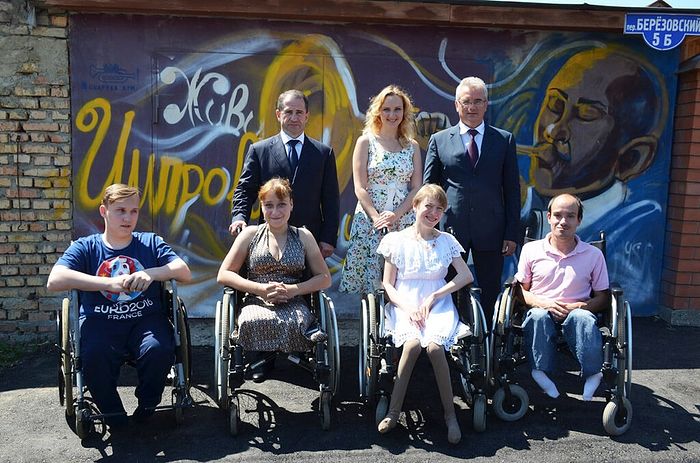



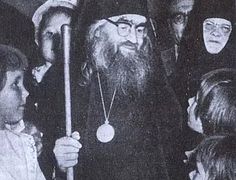
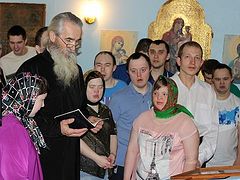
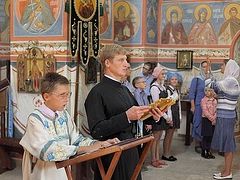

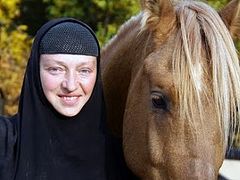

Reading your article was a great grace and I am thankful to know of your wonderful work. If you know of Jean Vanier the Founder of L'Arche in France & now in many countries: Canada where he was born, USA, Italy, etc. Their approach and spirit is much like what you do for the handicapped. Perhaps knowing more will help you all with the inspiring work you do. Also, do you know Helen Keller? American girl born deaf and blind? Her story changed much regarding American attitudes toward the disabled. They made a wonderful movie about her. It made a great impression on me when I was a lad in the '60s. It is called The Miracle Worker. Well worth finding because even if a language barrier, it can be understood readily, lifting the soul and heart. God bless and keep you and prosper your great work. THANK YOU! In HIM, M.O'N. (USA)
PS: Could not enter digits as no picture was found.